'We got it done': How a Texas couple changed course of history for sick, injured veterans
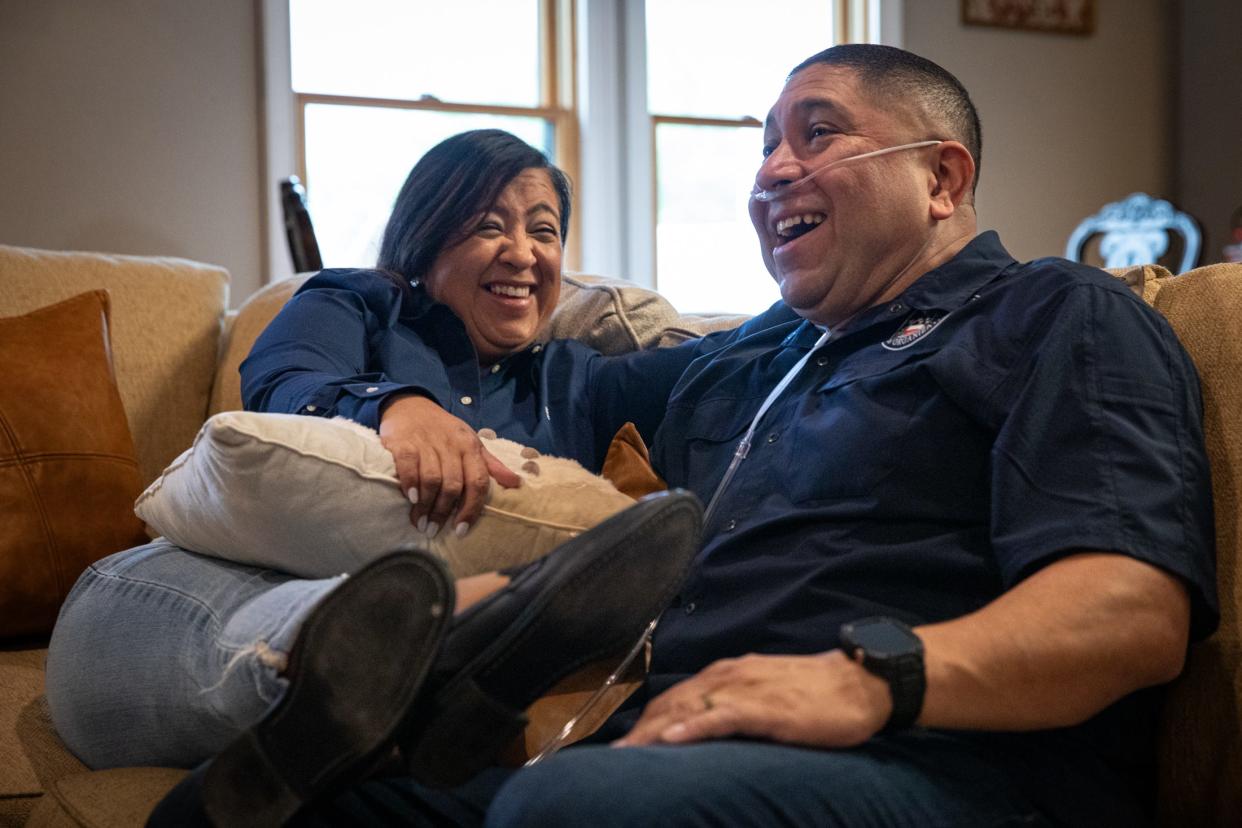
- Oops!Something went wrong.Please try again later.
As a career law enforcement officer and a part-time soldier who was deployed to war, giving up without fighting back was never an option for Le Roy Torres.
As the wife of a law enforcement officer and warrior who returned home from Iraq wounded and sick, protecting and supporting her husband was the only option for Rosie Torres. Even if it meant battling the U.S. government, laying bare her husband's vulnerabilities and publicly sharing her fears.
For the couple from the Coastal Bend community of Robstown, their fight for veterans sickened by toxic burn pits during wartime deployments would take them from selling cupcakes and tamales in big-box store parking lots to helping underwrite the cost of maintaining the nonprofit they founded to sleeping on the steps of the nation's Capitol to draw attention to their cause. It would take them 13 years, nearly all of them with Le Roy Torres sick to the point of debilitation, to see their cause prevail.
More: President Biden's signature caps Texas couple's 13-year battle for burn pit exposure help
And when they finally won, the victory was not only for themselves, but also for hundreds of thousands of the nation's veterans who, like Le Roy Torres, became deathly sick from round-the-clock exposure to massive toxic burn pits the military used to dispose of battlefield waste. And it would bring nearly $2 billion in health benefits that for years had been denied to those injured, sick and dying men and women who served in uniform for the nation's defense.
Burn pits and the 'Iraqi crud'
Le Roy Torres was a captain in the Army Reserve in 2007 when he paused his civilian job as a trooper for the Texas Department of Public Safety and deployed with his unit to Iraq. Assigned to Joint Base Balad, one of the largest war zone U.S. installations, for a one-year hitch, Torres worked, ate, slept and exercised amid the acrid black smoke that billowed from the 10-acre burn pit fueled 24/7 by anything and everything that was disposable.
The 250 tons that were reduced to ashes every day included spent munitions, broken-down gear, worn-out tires, petrochemicals, medical waste and amputated body parts.
He and others assigned to the base called the gray mucus they were coughing up the "Iraqi crud." For Torres, that crud followed him home from war. And after his deployment had ended his health declined and he was ultimately diagnosed with constrictive bronchiolitis, a life-threatening and nonreversible lung disease.
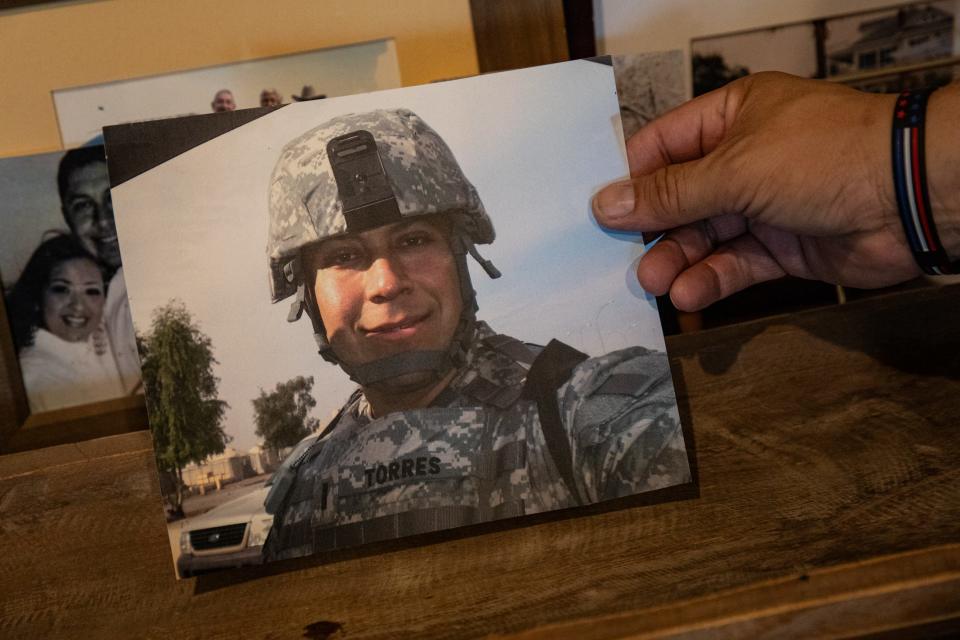
When he was denied benefits through the Veteran Affairs Department on grounds that his illness was not service-related, he and his wife took action on their own. They started a website, BurnPits360.org, where veterans who’ve experienced health issues from exposure to the toxic fires and smoke could share stories and information.
It turned out there were thousands of veterans who returned from overseas deployments with sicknesses similar to the ones Torres was suffering from. Many had died, leaving their families to tell their stories and to fight for the benefits that had been held out of reach.
More: What are burn pits? How toxic blazes endangered Iraq, Afghanistan military veterans
The Torreses met many of them, both in person and online. They shared stories and relied on one another for support and comfort. And they grieved for one another whenever another suffering veteran died.
But convincing federal authorities that they were due veterans health benefits would take years.
“There were a lot of doors shut in our face,” Rosie Torres later recalled.
'Thank you for your service'
Filmmaker Kevin Flounlacker, who owns Lake View Visual of Harrisburg, Pa., said he first became aware of the fallout from burn pit exposure when he learned that the father-in-law of a friend of a friend had become sick.
He went to Washington about five years ago while Congress was conducting an early hearing on what would become the Promise to Address Comprehensive Toxics Act with a yet-to-be-developed idea for a film. That's where he first met Rosie Torres, who was there to testify about Le Roy's frustrating battle with the VA.
Their connection was immediate. Months later, Rosie approached Flounlacker about producing a public service announcement about the effects of burn pit exposure to help pressure Congress into action. From there sprang what would become "Thank You For Your Service: A Burn Pits Story," which now is in post-production and will help tell the story of the Torreses' fight to show the connection between exposure and illness.
Flounlacker said he hopes the film shows the disconnect between the "we support our troops" mantra that erupts when the nation goes to war and the "let's move on" mentality that relegates veterans to the shadows once they are back home and needing support.
"I think we all collectively stick our heads in the sand," he said. "When folks hear that service members come home and don't just receive health care, a lot of folks just assume that that's how things work — and they don't."
Added Sovanna Mam, the documentary's producer: "What I've learned about the Torres (couple) is that they are anything but average. They truly have the persistence of a thousand armies, and their ability to build a coalition of supporters, some of whom are national celebrities, is awe-inspiring."
Building alliances, achieving victory
It was not until 2022 that Congress finally put addressing burn pits at the top of its agenda, in no small measure because of the dogged determination of the Texas couple, and of others who joined the cause. In addition to veterans, along with their families or their survivors, high-profile allies emerged.
Comedian and activist Jon Stewart, who earlier had used his platform on Comedy Central's "The Daily Show" to advance the cause of 9/11 first responders made sick from the spewing toxins at Ground Zero, brought the same zeal to the burn pits fight. His presence with the Torreses and other veterans helped shine the national spotlight on the political gamesmanship that stalled the PACT Act in the Senate.
When the measure, which formally recognized illnesses from burn pit exposure as service-related and was hailed as the largest expansion of veterans health benefits in a generation, finally passed, Stewart held a news conference outside the Capitol and singled out Le Roy Torres for his and his wife's efforts.
“I talked to Le Roy four years ago in my office, and I made a promise to him," Stewart said at the time. "I said, ‘I’m not going to let you go, my brother’ and ‘we’re going to get this done.’ And guess what? We got it done."
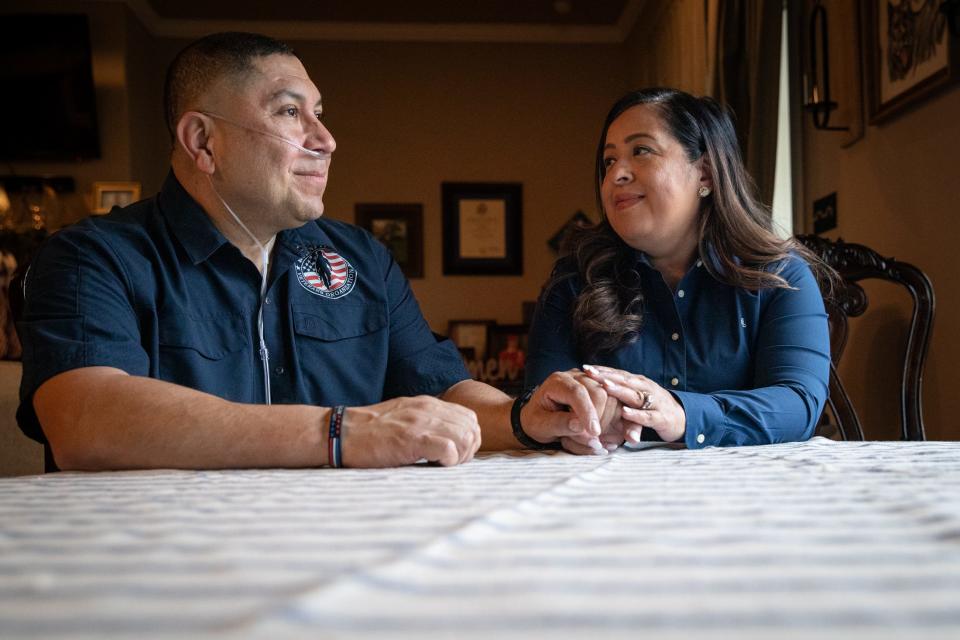
A White House ceremony, thanks from fellow vets
Rosie and Le Roy Torres were at President Joe Biden's side in the White House when the PACT Act was signed into law in August 2022.
In an interview 15 months later, both said they still feel a proud sense of accomplishment, and some lingering disbelief that their nonprofit, Burn Pits 360, which they started on a shoestring in 2009 and kept going with seat-of-the-pants fundraisers, helped change and shape national veterans policy.
More: Texas burn pit survivor and activist wins $2.5M judgment over DPS in reinstatement lawsuit
"We have these random people just coming up and thanking us," said Rosie Torres, recalling meeting a Vietnam veteran whose wartime injuries are covered by the PACT Act. "It just is a little surreal to hear. People thank us for something that really was tugging at our hearts and impacting our family — and started out at our kitchen table."
Le Roy Torres, who also was denied reinstatement at DPS with scaled-back duties to accommodate his service-related illnesses, recalled suffering despair as one setback after another marked his postwar life. He said he was sustained by realizing that so many veterans with similar injuries had lost their lives.
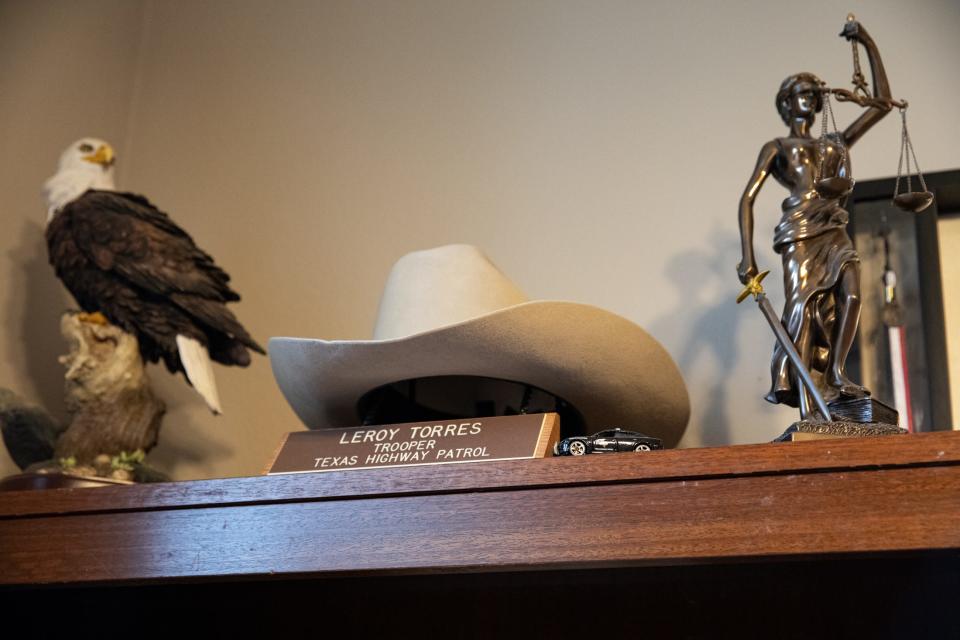
He found inspiration in the story of the late Staff Sgt. Steven Ochs, who after his deployment and burn pit exposure was diagnosed with acute myeloid leukemia and died in 2008. Ochs' sister gave Torres a photo of the soldier in his healthier days wearing the iconic chocolate-chip camouflage fatigues and maroon beret of the 82nd Airborne Division. The picture occupies a prominent place in Le Roy Torres' office.
"I have his photo on my desk as a reminder when those moments would get really difficult and I felt like, not necessarily giving up, but (I'm having) a very difficult day, I would look at that photograph and say, 'Hey, sir, you are not alone. We're here with you,’ ” Torres said.
State Sen. Juan "Chuy" Hinojosa, D-McAllen, who represents the Torreses and is the last Vietnam veteran still serving in the Texas Legislature, said in an interview that the couple's efforts on behalf of returning service members — past, present and future — cannot be overstated.
"The burn pit issue was ignored by the Veterans Department and the federal government and Congress, but for the efforts of Rosie Torres and her husband," said Hinojosa, who co-sponsored legislation the couple pushed to established a burn pit registry for Texas veterans. "They are fierce advocates. They never gave up.
"If one door was shut on them, they found another way to get through it and get people to listen to what was happening to veterans."
U.S. Rep. Joaquin Castro, D-San Antonio, nominated Le Roy and Rosie Torres for the Presidential Medal of Freedom for their burn pit advocacy and is waiting to hear whether his recommendation will be approved by the White House. Their efforts, Castro said in a statement, "changed the course of history" for suffering veterans. Castro said he is awestruck by the resolve of Le Roy Torres in the face of his illnesses.
"His story is a shining example of perseverance over pain, resilience, and commitment to the public good," Castro said. "I’m proud to have worked closely with the Torres family and it’s an honor to call them my friends. They deserve this recognition and so much more.”
More: Retiring state Rep. Abel Herrero called the unsung hero in raising awareness of burn pits
According to information on the White House website, since the PACT Act was passed, nearly 845,000 veterans or their survivors have filed claims for benefits through the VA. More than 330,000 of them have been approved, and the VA has paid out $1.85 billion on those claims.
Texas veterans account for nearly 95,000 of the total claims filed and 38,400 of the approvals. A dollar figure for Texas claims was not available.
In addition, more than 4.1 million veterans have received free screenings for toxic exposures from the VA under the PACT Act.
The Torreses credit Biden for rallying public support for the PACT Act, which spurred Congress to finally take action. The measure, formally called the Sgt. 1st Class Heath Robinson Honoring our Promise to Address Comprehensive Toxics Act, pays tribute to the Ohio soldier who was exposed to burn pits and died of cancer in 2020.
When plans were being made for the signing ceremony, Le Roy and Rosie Torres were surprised but pleased to receive an invitation to the White House. They were not part of the audience but were among the dignitaries and Robinson family members who stood alongside the president's desk as the legislation was formally enacted.
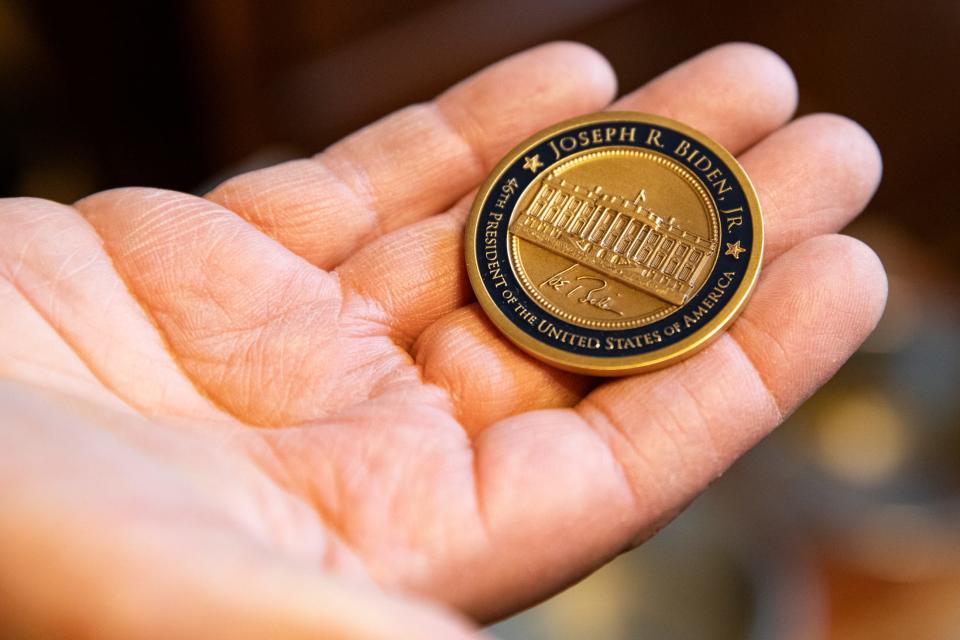
Biden made clear that the new law was personal to him. His son Beau was exposed to the pits during his deployment to Iraq as an officer in the National Guard. The president has said his son's death from brain cancer at 46 in 2015 was probably caused by the toxic smoke and fumes.
Rosie Torres said seeing firsthand Biden's emotions as a dad put aside any awe she might have felt about meeting the president.
"For me, it was really more like shaking the hand of a father who also had lost his son, not so much our president," she said. "Here's a dad who buried his son to these toxic wounds of war. Knowing what we went through, well, (his) family went through it too."
John C. Moritz covers Texas government and politics for the USA Today Network in Austin. Contact him at jmoritz@gannett.com and follow him on X, formerly Twitter, @JohnnieMo.
This article originally appeared on Austin American-Statesman: Meet the Robstown, TX couple whose work for sick vets led to PACT Act

